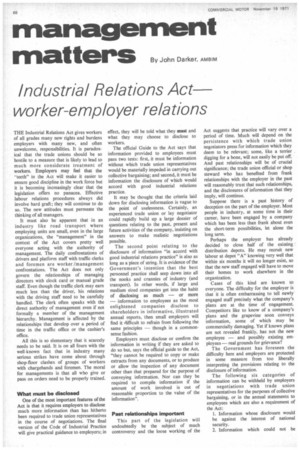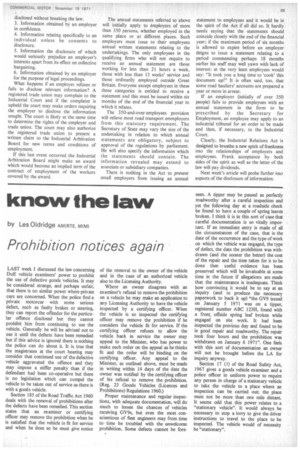Industrial Relations Act worker-employer relations
Page 66

Page 67

If you've noticed an error in this article please click here to report it so we can fix it.
THE Industrial Relations Act gives workers of all grades many new rights and burdens employers with many new, and often unwelcome, responsibilities. It is paradoxical that the trade unions should be so hostile to a measure that is likely to lead to much more considerate treatment of workers. Employers may feel that the "teeth" in the Act will make it easier to ensure good discipline in the work force but it is becoming increasingly clear that the legislation offers no panacea. Effective labour relations procedures always did involve hard graft; they will continue to do so. The new attitudes must permeate the thinking of all managers.
It must also be apparent that in an industry like road transport where employing units are small, even in the large organizations, the "management" in the context of the Act covers pretty well everyone acting with the authority of management. The daily confrontations of drivers and platform staff with traffic clerks and foremen are worker/management confrontations. The Act does not only govern the relationships of managing directors with clock card or manual grade staff. Even though the traffic clerk may earn much less than the driver, his relations with the driving staff need to be carefully handled. The clerk often speaks with the direct authority of management even if not formally a member of the management hierarchy. Management is affected by the relationships that develop over a period of time in the traffic office or the cashier's office.
All this is so elementary that it scarcely needs to be said. It is on all fours with the well-known fact that in industry many serious strikes have come about through shop floor clashes of groups of workers with chargehands and foremen. The moral for managements is that all who give or pass on orders need to be properly trained.
What must be disclosed One of the most important features of the Act is that it requires employers to disclose much more information than has hitherto been required to trade union representatives in the course of negotiations. The final version of the Code of Industrial Practice will give practical guidance to employers; in effect, they will be told what they must and what they may choose to disclose to workers.
The official Guide to the Act says that information provided to employees must pass two tests: first, it must be information without which trade union representatives would be materially impeded in carrying out collective bargaining; and second, it must be information the disclosure of which would accord with good industrial relations practice.
It may be thought that the criteria laid down for disclosing information is vague to the point of uselessness. Certainly, an experienced trade union or lay negotiator could rapidly build up a large dossier of questions relating to the past, present and future activities of the company, insisting on answers to make realistic negotiations possible.
The second point relating to the disclosure of information "in accord with good industrial relations practice" is also as long as a piece of string. It is evidence of the Government's intention that the best personnel practice shall seep down into all the nooks and crannies of industry (and transport). In other words, if large and medium sized companies get into the habit of disclosing as much — or more — information to employees as the most enlightened companies disclose to shareholders in informative, illustrated annual reports, then small employers will find it difficult to refrain from following the same principles — though in a commonsense fashion.
Employers must disclose or confirm the information in writing if they are asked to do so but, says the official guide to the Act. "they cannot be required to copy or make extracts from any documents, or to produce or allow the inspection of any document other than that prepared for the purpose of conveying information. Nor can they be required to compile information if the amount of work involved is out of reasonable proportion to the value of the information".
Past relationships important This part of the legislation will undoubtedly be the subject of much controversy and the loose working of the Act suggests that practice will vary over a period of time. Much will depend on the persistence with which trade union negotiators press for information which they deem to be relevant; some, like a terrier digging for a bone, will not easily be put off.
And past relationships will be of crucial significance; the trade union official or shop steward who has benefited from frank relationships with the employer in the past will reasonably trust that such relationships, and the disclosures of information that they imply, will continue.
Suppose there is a past history of deception on the part of the employer. Most people in industry, at some time in their career, have been engaged by a company which has been less than frank about even the short-term possibilities, let alone the long term.
Perhaps the employer has already decided to close half of the existing • distribution depots. He may recruit new labour at depot "A" knowing very well that within six months it will no longer exist, so that the new staff engaged will have to move their homes to work elsewhere in the organization.
Cases of this kind are known to everyone. The difficulty for the employer is that it is often embarrassing to tell newly engaged staff precisely what the company's plans are at the time of engagement.
Competitors like to know of a company's plans and the grapevine soon conveys information, some of which may be commercially damaging. Yet if known plans are not revealed frankly, has not the new employee — and possibly existing em ployees— real grounds for grievance?
The Government has foreseen the difficulty here and employers are protected in some measure from too liberally interpreting the provisions relating to the disclosure of information.
The following six categories of information can be withheld by employers in negotiations with trade union representatives for the purposes of collective bargaining, or in the annual statements to employees which are also a requirement of the Act: I. Information whose disclosure would be against the interest of national security.
2. Information which could not be disclosed without breaking the law.
3. Information obtained by an employer in confidence.
4. Information relating specifically to an individual unless he consents to disclosure.
5. Information the disclosure of which would seriously prejudice an employer's interests apart from its effect on collective bargaining.
6. Information obtained by an employer for the purpose of legal proceedings.
What happens if an employer refuses or fails to disclose relevant information? A registered trade union may complain to the Industrial Court and if the complaint is upheld the court may make orders requiring the employer to disclose the information sought. The court is likely at the same time to determine the rights of the employer and trade union. The court may also authorize the registered trade union to present a written claim to the Industrial Arbitration Board for new terms and conditions of employment.
If this last event occurred the Industrial Arbitration Board might make an award which would become an implied term of the contract of employment or the workers covered by the award.
The annual statements referred to above will initially apply to employers of more than 350 persons, whether employed in the same place or at different places. Such employers must issue to their employees annual written statements relating to the undertakings. The only employees in the qualifying firms who will not require to receive an annual statement are those working for less than 21 hours a week, those with less than 13 weeks' service and those ordinarily employed outside Great Britain. Everyone except employees in these three categories is entitled to receive a statement and this must be issued within six months of the end of the financial year to which it relates.
The 350-and-over-employees provision will relieve most road transport emmployers from this statutory requirement. The Secretary of State may vary the size of the undertaking in relation to which annual statements are obligatory, subject to approval of the regulations by parliament. He will also specify the information which the statements should contain. The information revealed may extend to associate or subsidiary companies.
There is nothing in the Act to prevent small employers from issuing an annual statement to employees and it would be in the spirit of the Act if all did so. It hardly needs saying that the statements should coincide closely with the end of the financial year; if the maximum period of six months is allowed to expire before an employer deigns to issue a statement relating to a period commencing perhaps 18 months earlier his staff may well yawn with lack of interest: at the very least employees would say: "It took you a long time to 'cook' this document up!" It is often said, too, that some road hauliers' accounts are prepared a year or more in arrear.
If an employer (initially of over 350 people) fails to provide employees with an annual statement in the form to be prescribed by the Secretary for Employment, an employee may apply to an industrial tribunal for an order to be made and then, if necessary, to the Industrial Court.
Clearly, the Industrial Relations Act is designed to breathe a new spirit of frankness into the relationships of employers and employees. Frank acceptance by both sides of the spirit as well as the letter of the law will pay dividends.
Next week's article will probe further into aspects of the disclosure of information.




















































































































